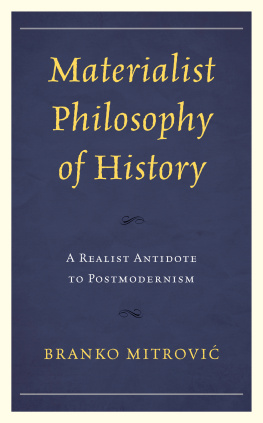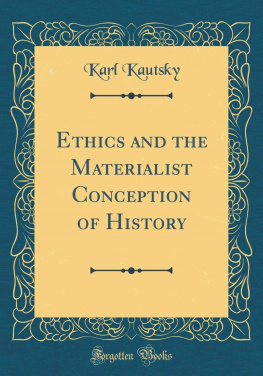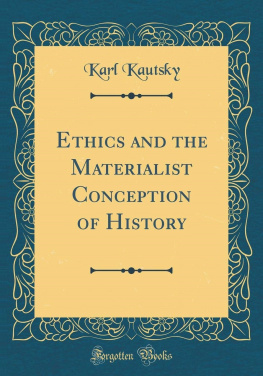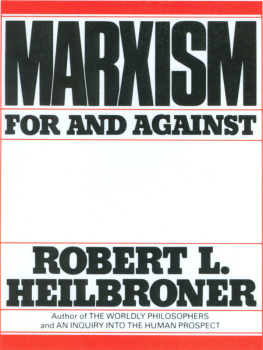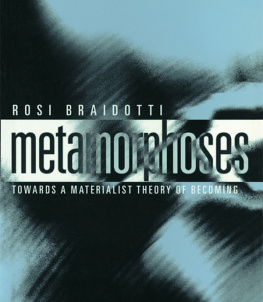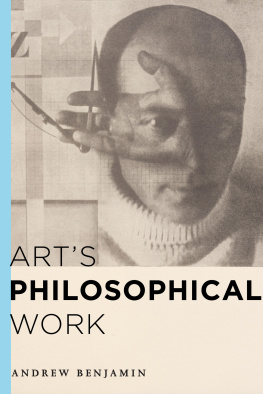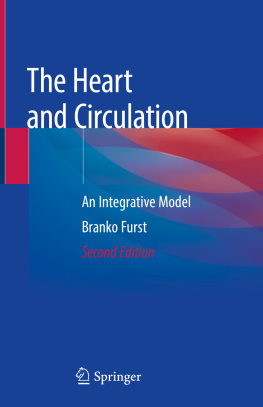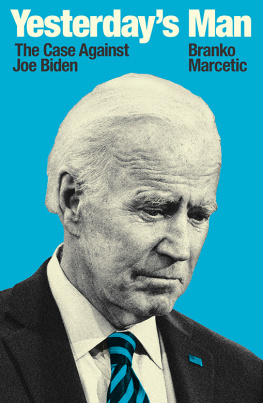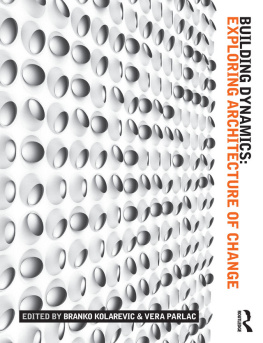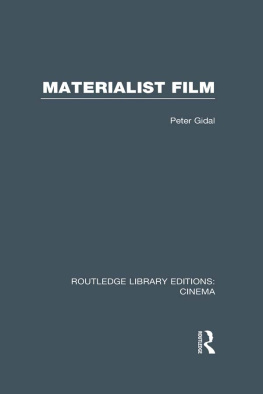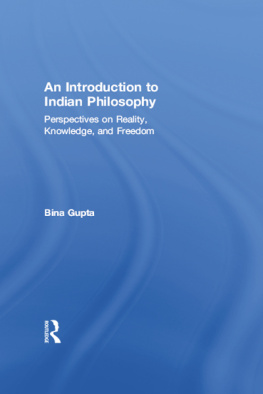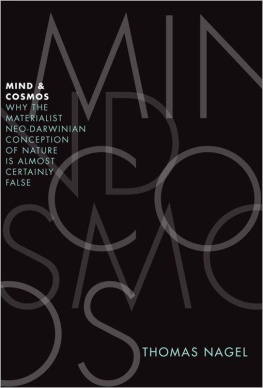Branko Mitrović - Materialist Philosophy of History
Here you can read online Branko Mitrović - Materialist Philosophy of History full text of the book (entire story) in english for free. Download pdf and epub, get meaning, cover and reviews about this ebook. year: 2012, publisher: undefined, genre: Religion. Description of the work, (preface) as well as reviews are available. Best literature library LitArk.com created for fans of good reading and offers a wide selection of genres:
Romance novel
Science fiction
Adventure
Detective
Science
History
Home and family
Prose
Art
Politics
Computer
Non-fiction
Religion
Business
Children
Humor
Choose a favorite category and find really read worthwhile books. Enjoy immersion in the world of imagination, feel the emotions of the characters or learn something new for yourself, make an fascinating discovery.
- Book:Materialist Philosophy of History
- Author:
- Publisher:undefined
- Genre:
- Year:2012
- Rating:3 / 5
- Favourites:Add to favourites
- Your mark:
- 60
- 1
- 2
- 3
- 4
- 5
Materialist Philosophy of History: summary, description and annotation
We offer to read an annotation, description, summary or preface (depends on what the author of the book "Materialist Philosophy of History" wrote himself). If you haven't found the necessary information about the book — write in the comments, we will try to find it.
Materialist Philosophy of History — read online for free the complete book (whole text) full work
Below is the text of the book, divided by pages. System saving the place of the last page read, allows you to conveniently read the book "Materialist Philosophy of History" online for free, without having to search again every time where you left off. Put a bookmark, and you can go to the page where you finished reading at any time.
Font size:
Interval:
Bookmark:
Materialist Philosophy of History
Materialist Philosophy of History
A Realist Antidote to Postmodernism
Branko Mitrovic
LEXINGTON BOOKS
Lanham Boulder New York London
Published by Lexington Books
An imprint of The Rowman & Littlefield Publishing Group, Inc.
4501 Forbes Boulevard, Suite 200, Lanham, Maryland 20706
www.rowman.com
6 Tinworth Street, London SE11 5AL, United Kingdom
Copyright 2020 by The Rowman & Littlefield Publishing Group, Inc.
All rights reserved. No part of this book may be reproduced in any form or by any electronic or mechanical means, including information storage and retrieval systems, without written permission from the publisher, except by a reviewer who may quote passages in a review.
British Library Cataloguing in Publication Information Available
Library of Congress Cataloging-in-Publication Data
Names: Mitrovic, Branko, author.
Title: Materialist philosophy of history : a realist antidote to postmodernism / Branko Mitrovic.
Description: Lanham : Lexington Books, 2020. | Includes bibliographical references and index. | Summary: This book examines the wide-ranging implications for historical research of the view that everything is physical and that no immaterial entities, forces, or phenomena exist. It presents the consequences of materialism for our understanding of the historical past, including the rejection of postmodernist perspectives on history-- Provided by publisher.
Identifiers: LCCN 2020010393 (print) | LCCN 2020010394 (ebook) | ISBN 9781793620002 (cloth) | ISBN 9781793620026 (paperback) | ISBN 9781793620019 (ebook)
Subjects: LCSH: Materialism. | History--Philosophy.
Classification: LCC B825 .M58 2020 (print) | LCC B825 (ebook) | DDC 901--dc23
LC record available at https://lccn.loc.gov/2020010393
LC ebook record available at https://lccn.loc.gov/2020010394
 TM The paper used in this publication meets the minimum requirements of American National Standard for Information Sciences Permanence of Paper for Printed Library Materials, ANSI/NISO Z39.48-1992.
TM The paper used in this publication meets the minimum requirements of American National Standard for Information Sciences Permanence of Paper for Printed Library Materials, ANSI/NISO Z39.48-1992.
Phoebe fave...
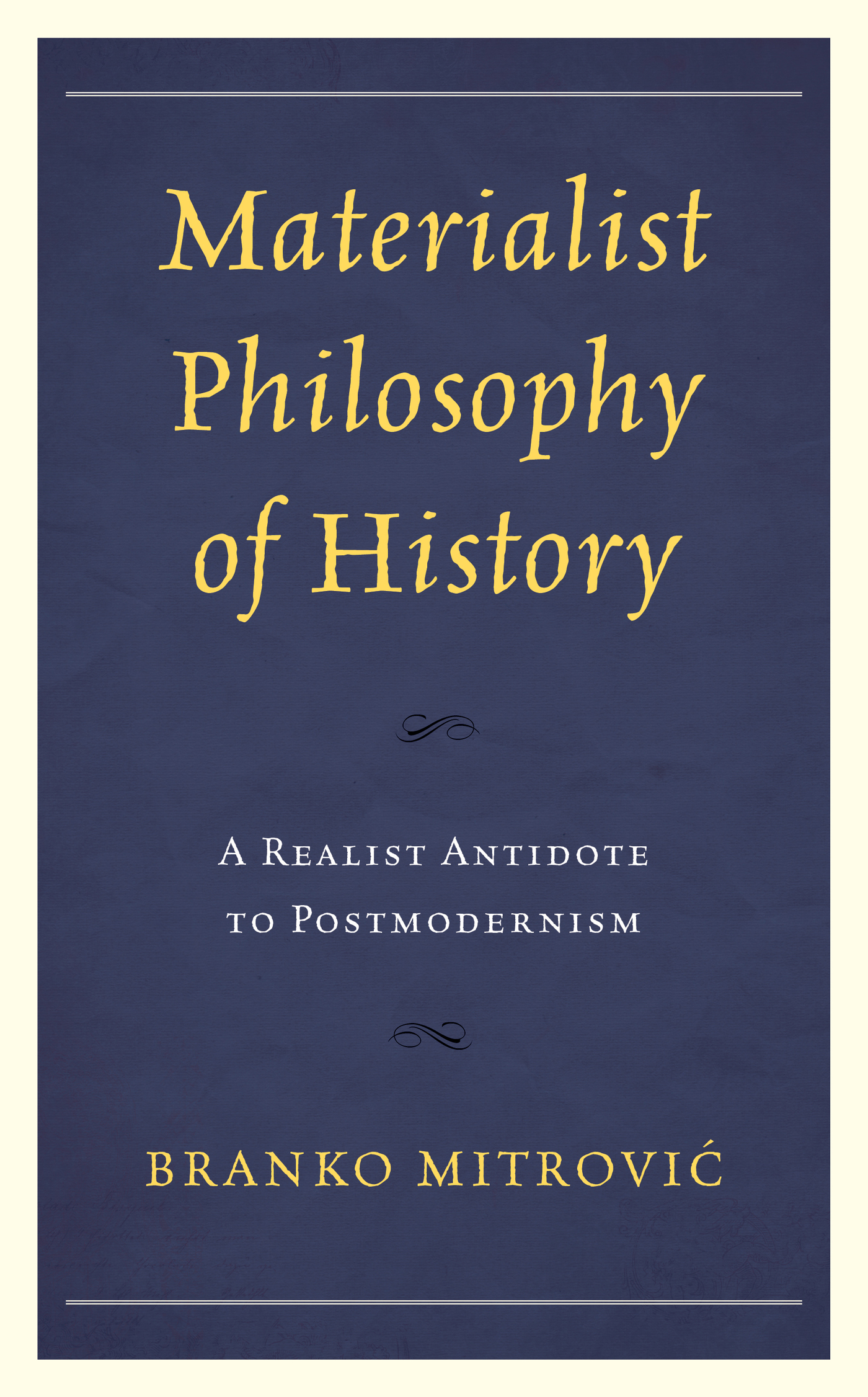
Almost twenty years ago, without thinking that these interests would eventually result in a book, I started to analyze in a systematic way the methodological problems and dilemmas that I encountered in my historical work and in works of my colleagues. Originally, I thought of this interest as an interest in the methodology of historical research, and only after some time I realized that these problems were, in fact, genuine philosophical problems that belong properly in the field of the philosophy of history. I owe this insight to my doctoral adviser in philosophy, Christopher Martinas he put it when I described the topic: You are proposing to do more philosophy, not less. The choice of methodological problems that interested me seemed spontaneous at the time. The approach, it soon turned out, had to be bi-disciplinary, pertaining to the philosophical treatment of methodological problems on the one hand and their position in the history of historiography on the other. Over a decade, its result was two series of papers that came out mostly in History and Theory and the Journal of Art Historiography. I owe huge gratitude to the editors of these two journals, Brian Fay and Richard Woodfield for their interest in my work, encouragement and theoretical feedback regarding numerous issues and dilemmas that I faced while working on these articles. When it comes to the philosophical papers and ultimately the material that makes up this book, I also need to express my gratitude to Nick Zangwill, Barry Smith, Ian Verstegen and Robert Nola for extensive philosophical help, advice and support, as well as to my proof-editors Karen Wise and Julie Perkins for their help with written English.
The papers pertaining to the history of the methodological problems that interested me, mostly originally published in the Journal of Art Historiography, gradually came to present a coherent picture about the rise of collectivist ideologies in German (art) historiography and became my book Rage and Denials, published by the Penn State University Press in 2015. By that time I also knew that my philosophical work on the methodology of historical research constituted material for a book. Nevertheless, the awareness about the nature of this project developed in phases. Originally, I thought that the book was about the philosophy of intellectual history, because most of my work up to that time pertained to problems of interpretation. However, methodological problems of interpretation are not limited to intellectual history; all historians face them and it took me some time to accept that the implications of the book necessarily pertained to a wider picture. It took another, later, insight to realize that my methodological concerns, that stimulated my interests in the philosophy of history from the beginning, were consistently motivated by my unwillingness to accept the expansion of ontology beyond the physical world. The very choice of the methodological dilemmas that I sought to resolve in my earlier work was not spontaneous as I originally thought; rather, it was motivated by my rejection of (what I perceived as) the widespread ontological laxity in the historical works that I read. My tendency to see hidden (often political) agendas behind inflationary ontologies only strengthened my motivation through the years in which I worked on these problems.
From the very beginning of my work in the philosophy of history I have been aware that my views and assumptions were incompatible with and opposed to the postmodernist perspectives that were dominant in the final decades of the twentieth century and whose influence is still sometimes strongly felt. My original intention was, nevertheless, to avoid the discussion of postmodernism in this book, and I am therefore grateful to the anonymous reviewer of the manuscript for emphasizing the need to describe explicitly the incompatibility of materialism with anti-realist, anti-foundationalist and social-constructionist paradigms. I have no doubt that postmodernist perspectives have had poisonous effects on the intellectual life and the political culture of English-speaking countries for the past half a century. In the philosophy of history they have led the discipline into a dead end and resulted in its reduction into desperate and unproductive efforts to prove that the past did not happen. The introduction of questions pertaining to the methodology of historical research and to the compatibility of our understanding of the past with the materialist, physicalist worldview should, I hope, help break the deadlock.
Philadelphia, December 2019.
I should like to express my gratitude to History and Theory and Journal of Art Historiography for the permission to reproduce parts of the following articles:
Mitrovic, Branko. Intellectual History, Inconceivability and Methodological Holism. History and Theory 46 (2007): 2947.
Mitrovic, Branko. Intentionalism, Intentionality and Reporting Beliefs. History and Theory 48 (2009): 180198.
Mitrovic, Branko. Atribution of Concepts and Problems with Anachronism. History and Theory 50 (2011): 303327.
Mitrovic, Branko. Opacity and Transparency in Historical Representations. Frank Ankersmit: Meaning, Truth and Reference in Historical Representation
Next pageFont size:
Interval:
Bookmark:
Similar books «Materialist Philosophy of History»
Look at similar books to Materialist Philosophy of History. We have selected literature similar in name and meaning in the hope of providing readers with more options to find new, interesting, not yet read works.
Discussion, reviews of the book Materialist Philosophy of History and just readers' own opinions. Leave your comments, write what you think about the work, its meaning or the main characters. Specify what exactly you liked and what you didn't like, and why you think so.

